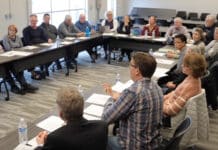Two St. Paul churches won a victory over the city of St. Paul regarding taxes inappropriately levied against property owners under the guise of fees.
The city had argued that the monetary imposition was a fee levied under its power to tax. The First Baptist Church of St. Paul and the Church of St. Mary disagreed, arguing that the charge was not imposed, was not done so uniformly on similar properties, and the amount they were assessed exceeded the benefit to their properties.
At the time the charges in question were levied, St. Paul was the only city to fund street maintenance through such measures, according to the court opinion.
“Special assessments for local improvements are levied under a municipality’s taxing power,” held the court, “As an exercise of the taxing power, a special assessment is subject to constitutional restrictions.”
The city argued that as the money raised goes in part to fund police services and therefore is collected under the city’s policing powers, rather than its taxing powers. The court rejected this, saying it does not matter what powers the money is spent on once it is collected. The question instead is what power was used to collect the money in the first place.
“We consider it significant that, unlike typical police-power fees, the ROW assessment is not imposed on a limited group of payers; rather, the charge is assessed to, and raises revenue from, the owners of almost all properties within the city limits,” held the court, “Moreover, the City has not shown that the charge is necessitated by the cost of regulating any of the charged properties in the manner of a true regulatory or license fee.”
The court went on to further point out that the services resulting from the money collected go to benefit everyone who uses the St. Paul roads, not just the owners of street facing properties.
This decision will severely impact how St. Paul funds its road maintenance and other projects funded through such fees.
“This case represents a victory for Minnesota taxpayers who deserve a fair, transparent and accountable tax system,” said Peter Nelson, a Vice President and Senior Policy Fellow at Center of the American Experiment who filed an Amicus Brief on behalf of the Center.
The Center of the American Experiment also noted that the First Baptist Church was charged over $15,000 by the city, while the 25-story UBS Plaza was charged only $5,500.
The Supreme Court reversed the decisions of the lower courts which decided that St. Paul was exercising its policing powers. The case has been remanded to those courts for further proceedings not inconsistent with the Supreme Court’s decision.











![Untitled design-6 By McGhiever (Own work) [CC BY-SA 3.0 (https://creativecommons.org/licenses/by-sa/3.0)], via Wikimedia Commons](https://alphanews.org/wp-content/uploads/2016/08/Untitled-design-6-1-696x392.jpg)